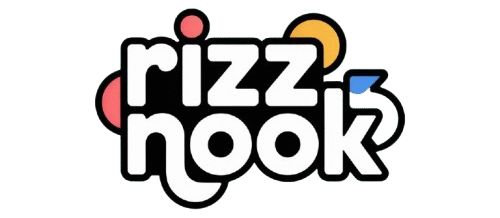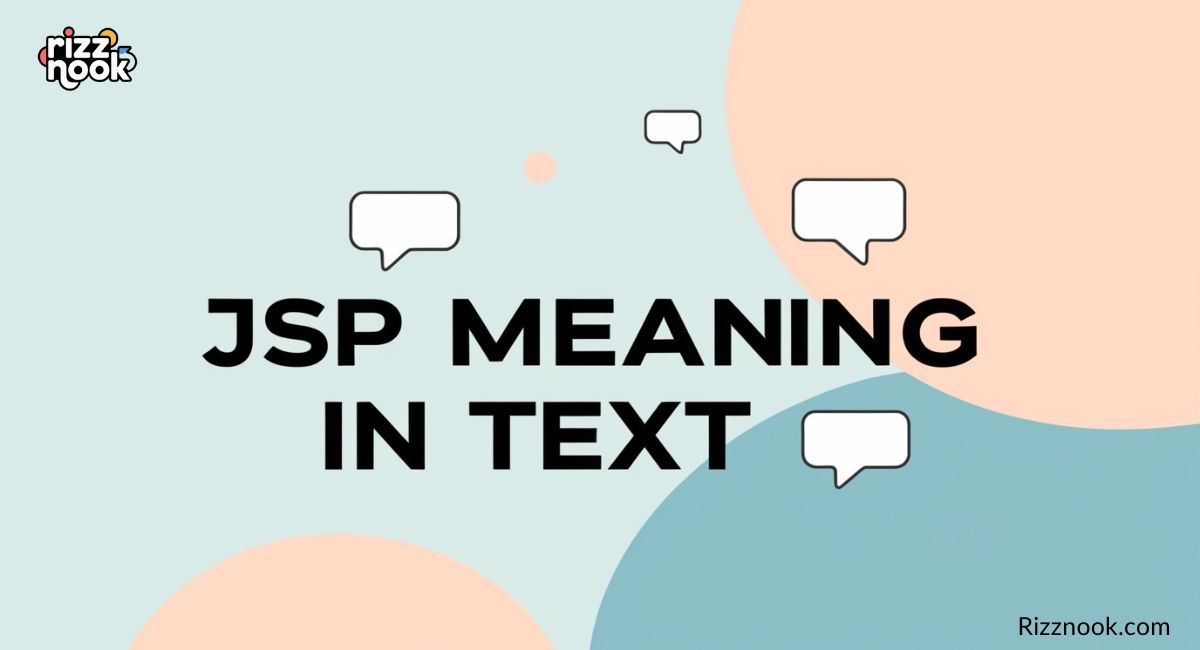“JSP Meaning in Text” is a common phrase you may come across in chats, social media, or online conversations. JSP is a texting slang term used to keep messages short and casual. Understanding these abbreviations can help you chat smoothly and stay updated with modern communication styles.
In most cases, JSP stands for “Just Saying, Please” or sometimes “Just Saying, Pal.” Its meaning can change slightly depending on tone, context, and the relationship between the people texting. Knowing how to use JSP correctly can help you avoid confusion and express yourself more clearly in messages.
Definition & Meaning
JSP is internet slang for “Just Saying, Period,” used to add emphasis and finality to a statement, letting others know you’ve made your point and aren’t open to debate.
Examples in Conversations:
- “You should really apologize… JSP.”
- “That movie was overrated, JSP.”
- “I’m not going to that party, JSP.”
JSP carries multiple interpretations depending on where and how it’s used:
- JavaServer Pages: A widely used technology in web development for creating dynamic web content
- Jump Street Productions: A popular gaming community and content creation group
- Java Service Provider: A term used in enterprise software architecture
- Joint Strategic Plan: Common terminology in business and military planning contexts
Always examine the surrounding conversation and setting before jumping to conclusions about what JSP means. The same three letters can signal everything from casual slang to technical jargon, making contextual awareness essential for proper interpretation.
Background & History
Origins in Digital Communication
The slang interpretation of JSP, meaning “Just Saying, Period,” grew organically from the fast-paced world of online forums and text messaging, where brevity became essential. As digital conversations demanded quicker responses, users naturally gravitated toward condensed expressions that packed maximum meaning into minimal characters.
Timeline of Development
- Early 2000s: The foundation was laid as abbreviations like “J/K” (just kidding) and “TBH” (to be honest) became mainstream in online communication.
- 2010s to Present Day: JSP emerged as a powerful conversational tool, allowing users to add finality and emphasis to their statements while effectively closing off further debate.
- Mid 2010s: Cross-Platform Expansion: The acronym spread beyond text messages into comment sections, YouTube discussions, and gaming communities, where quick, assertive communication was highly valued.
Usage in Various Contexts
Texting and Social Media Conversations
In personal messaging and social networking spaces, JSP serves as a conversational full stop that adds weight to your statement without sounding aggressive. It’s the digital equivalent of dropping the mic after making your point.
Example:
- “You’re wrong, JSP.”
- “That restaurant has the best pizza in town, JSP.”
Gaming Communities
Within competitive gaming environments, players deploy JSP to confidently claim victory or shut down opponents’ banter. It’s become a staple of post-match commentary and in-game chat.
Example:
- “I carried the team, JSP.”
- “That clutch was all skill, JSP.”
Professional and Workplace Communications
Though less common in formal settings, younger professionals occasionally use JSP in casual Slack channels or team chats to politely but firmly state their position during brainstorming sessions or friendly workplace debates.
Example:
- “The new design layout works better, JSP.”
- “We should prioritize the mobile version first, JSP.”
Online Debates and Comment Sections
JSP frequently appears in YouTube comments, Reddit threads, and Twitter replies where users want to state their opinion definitively while signaling they’re not interested in lengthy back-and-forth exchanges.
Example:
- “The original version was superior, JSP.”
- “This policy won’t solve the actual problem, JSP.”
Professional Settings?
🚫 Keep JSP out of professional emails, client correspondence, and formal presentations; its casual tone undermines professionalism and can appear dismissive or unprofessional to colleagues and superiors.
Common Misconceptions
| Misconception | Reality |
| JSP exclusively refers to JavaServer Pages | Context determines meaning. In everyday conversations and on social media, JSP functions as slang for “Just Saying, Period,” while in technical environments, it refers to the programming technology. |
| Using JSP is inherently rude or aggressive | Tone and delivery shape perception. JSP can express playful banter between friends or come across as dismissive in heated arguments; the surrounding context makes all the difference. |
| JSP is outdated internet slang | The acronym continues gaining popularity, especially among younger generations on platforms like TikTok, Discord, and Instagram, proving its staying power in digital vocabulary. |
| Only teenagers and young adults use JSP | While most common among younger demographics, people across various age groups have adopted JSP in their casual online interactions, particularly those active in gaming and social media communities. |
| JSP can be used interchangeably with similar phrases | Unlike “IMO” (in my opinion) or “IMHO” (in my humble opinion), JSP carries a more definitive, conversation-ending quality that distinguishes it from other opinion-based acronyms. |
Similar Terms & Alternatives
| Acronym | Full Meaning | Contextual Usage Example |
| JSP | Just Saying, Period | “You’re being stubborn, JSP.” |
| JS | Just Saying | “JS, but you should really listen to the feedback.” |
| TBH | To Be Honest | “TBH, that was a terrible idea from the start.” |
| NGL | Not Gonna Lie | “NGL, your presentation could use more visuals.” |
| IMO | In My Opinion | “IMO, the sequel was way better than the original.” |
| IMHO | In My Humble Opinion | “IMHO, we should reconsider the entire approach.” |
| Real Talk | Being Genuine/Serious | “Real talk, you need to work on your time management.” |
How to Respond to JSP
Lighthearted and Playful Replies
When the conversation is casual and friendly, mirror their energy with humor and wit.
- “Lol, noted. JSP back at ya!”
- “Okay, okay, I hear you loud and clear!”
Humorous Comebacks
Turn the moment into a joke to keep things fun and defuse any potential tension.
- “JSP? More like Just Spitting Facts!”
- “Did you just drop the mic with three letters?”
Professional and Diplomatic Approaches
In work-related or serious contexts, acknowledge their statement while keeping doors open for continued dialogue.
- “Understood. Let’s discuss this further when you have time.”
- “I appreciate your perspective on this matter.”
Agreeable and Supportive Responses
Show solidarity when you genuinely align with their viewpoint.
- “You’re absolutely right, no arguments here!”
- “Facts! Couldn’t have said it better myself.”
Challenging Yet Respectful Counters
When you disagree but want to maintain respect, offer a gentle pushback.
- “I see your point, but hear me out for a sec.”
- “Fair enough, though I’ve got a different take on it.”
Regional or Cultural Differences
- US/UK: Predominantly used as conversational slang meaning “Just Saying, Period” across social media, texting platforms, and casual online interactions.
- Tech World: Universally recognized as JavaServer Pages, a server-side programming technology for building dynamic web applications and enterprise solutions.
- East Asia: Frequently appears in competitive gaming environments, particularly in South Korea and Japan, where abbreviated English phrases blend with local gaming culture.
- Latin America: Gaining traction on Spanish and Portuguese language platforms, often mixed with local slang to create hybrid expressions in digital conversations.
- Australia/NZ: Embraced enthusiastically in informal online banter, fitting naturally into the region’s laid-back communication style and humor-driven internet culture.
JSP Meaning in Different Age Groups
Teenage Users (13 to 19 Years)
- High Frequency Usage: Teens incorporate JSP naturally into daily texting, social media comments, and group chats as part of their standard digital vocabulary.
- Playful Intent: Younger users typically deploy JSP with lighthearted, humorous intentions rather than serious confrontation.
- Platform Preference: Most commonly spotted on TikTok, Snapchat, Instagram, and Discord, where quick, punchy communication thrives.
- Peer Validation: Often used to assert opinions within friend groups while maintaining social bonds and showing confidence.
- Meme Culture Integration: Teens frequently pair JSP with trending memes, GIFs, and emojis to amplify comedic effect.
Young Adults (20 to 35 Years)
- Contextual Awareness: This demographic switches between slang JSP in casual settings and technical JSP (JavaServer Pages) in professional environments.
- Measured Application: Young adults use JSP more selectively, reserving it for moments when they want to firmly but politely end discussions.
- Cross Platform Presence: Appears across Twitter, Reddit, LinkedIn messages (informally), and gaming platforms with varying levels of formality.
- Professional Boundaries: Generally avoid JSP in formal work communications but embrace it in team chat apps during casual conversations.
- Dating App Usage: Sometimes surfaces in dating app conversations to playfully assert preferences or boundaries.
Middle Aged Adults (36 to 55 Years)
- Limited Recognition: Many in this age bracket remain unfamiliar with JSP as slang, potentially misinterpreting it as a technical term.
- Slower Adoption: Those who do understand it tend to use JSP sparingly, often learning the term from younger colleagues or family members.
- Professional Context Dominance: More likely to encounter JSP in workplace settings related to JavaServer Pages than in personal communications.
- Cautious Implementation: When used, it’s typically after observing how younger people employ it to avoid appearing out of touch.
Senior Adults (55+ Years)
- Minimal Awareness: The vast majority have never encountered JSP as slang and would default to assuming it’s an acronym for something technical or organizational.
- Traditional Communication Preference: This generation favors complete sentences and clear language over abbreviated internet slang.
- Learning Curve: Those active on social media or with tech-savvy grandchildren may gradually pick up the term’s casual meaning.
- Confusion Factor: Most likely to ask “What does JSP mean?” when they encounter it in messages or comments.
Is JSP Offensive?
⚠️ JSP isn’t inherently offensive, but it can feel dismissive or condescending when delivered with an aggressive tone or used to shut down someone’s feelings. Context and delivery determine whether it comes across as playful or disrespectful.
Frequently Asked Questions
What does JSP meaning in text?
JSP usually means “Just Saying, Please” and is used to soften a message in casual chatting.
What is the meaning of JSP in chat?
In chat, JSP is used to express a point politely or casually.
What does JSP stand for in social media?
On social media, JSP stands for “Just Saying, Please”, often added to a statement to sound less direct.
How do you use JSP in a sentence?
You can add JSP at the end of your sentence to make it friendly or less serious.
Is JSP a rude slang?
No, JSP is usually friendly and polite, depending on the tone of the conversation.
What does JSP mean in WhatsApp messages?
In WhatsApp, JSP means “Just Saying, Please”, used to express an opinion gently.
What is the full form of JSP in texting?
The full form of JSP in texting is “Just Saying, Please”.
Conclusion
Understanding JSP Meaning in Text helps you communicate more clearly in everyday chatting and online conversations. Since JSP usually stands for “Just Saying, Please”, it adds a polite or light tone to your message. This simple slang keeps your messages friendly and casual.
When using JSP in texting, social media, or messaging apps, just remember the context and tone of the conversation. It’s best for informal chats with friends or peers. By knowing how to use JSP correctly, you can express your thoughts naturally, avoid misunderstandings, and stay updated with modern texting language.
Read Next: YK Meaning in Text: What YK Means and How to Use It

Welcome to Rizz Nook! I am Kairo, an AI-powered SEO and Content writer with 4 years of experience. I help websites rank higher, drive more traffic, and look great. My goal is to make SEO and web design simple and effective for everyone. Let’s achieve more together.

